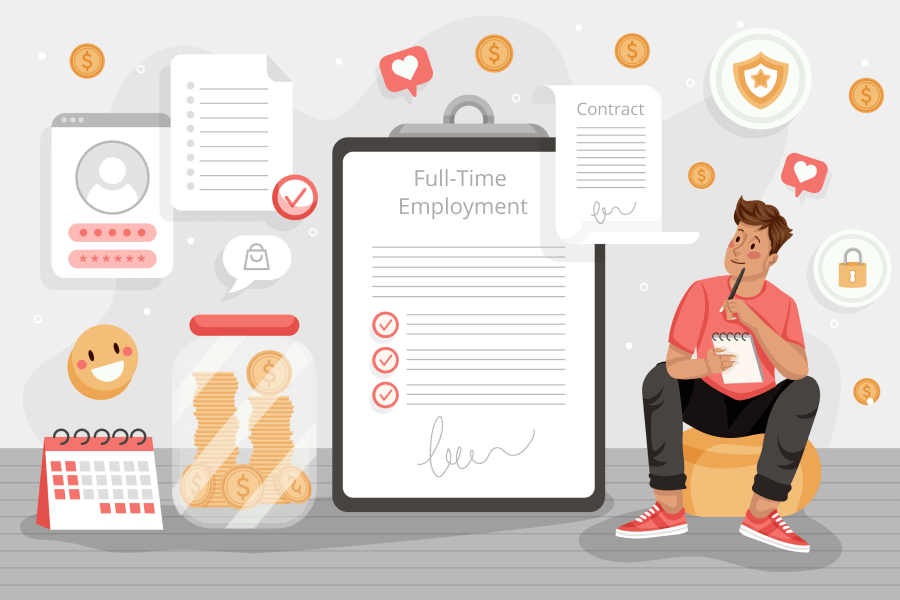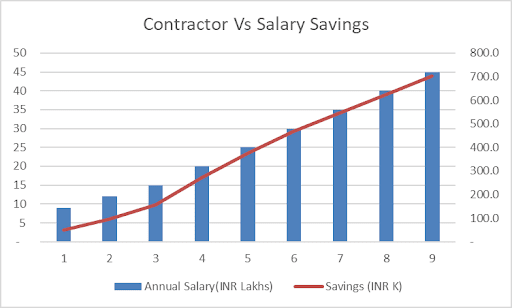Contract Vs Full- Time Employment- A Brief Comparison

Over the last two years, more people have signed up for more contractual and freelance roles. According to a recent report, the Indian staffing industry added almost 2.27 lakh contractual employees because of the increased demand in FMCG, E-commerce and Manufacturing industries in 2021-2022. This trend is setting in because contractual positions provide flexibility, letting people work when organisations need them or when they need to.And with the new labour codes implemented in July, contractors can enjoy the same benefits as full-time employees working in the same position.
People wishing for a blend of stability and change are moving to contractual roles. These roles fit perfectly with people who wish to work remote but do not want to handle too many clients like freelancers. It also gives contractual roles more autonomy over full-time employees. Organisations mostly hire contractors to avail their expertise on a particular project.
Deciding if you want to take up contractual work depends on factors like earning capacity, skills and experience, and career aspirations. Full-time and contractual jobs both have their own set of pros and cons. Let us Compare the two based on major deciding factors.
-
01- Job Security:
Both contractual and full-time jobs have a consistent inflow of monthly income. Thanks to the recent labour laws, contractors can enjoy the same benefits as full-time employees, working in the same role and position.
However, contractors are generally hired at an organisation for 11-12 months. Companies can extend their contract based on requirements and overall performance. But the sense of security is still slightly low, and contractors tend to keep looking for new opportunities instead of relying on their current company.
On the other hand, salaried individuals can choose to stay in an organisation longer and grow based on their performance. However, these employees are also not immune to sudden retrenchment due to reasons out of the company's control- for example, lack of funding or a pandemic.
Both contractual and full-time jobs have a consistent inflow of monthly income. Thanks to the recent labour laws, contractors can enjoy the same benefits as full-time employees, working in the same role and position.
However, contractors are generally hired at an organisation for 11-12 months. Companies can extend their contract based on requirements and overall performance. But the sense of security is still slightly low, and contractors tend to keep looking for new opportunities instead of relying on their current company.
On the other hand, salaried individuals can choose to stay in an organisation longer and grow based on their performance. However, these employees are also not immune to sudden retrenchment due to reasons out of the company's control- for example, lack of funding or a pandemic.
-
02- In-Hand Salary:
The benefits contractors and full-time employees gain can be different. Contractors are often not entitled to benefits such as gratuity either because of their term period or because the contract gets renewed every year, making it a consultancy agreement. However, a question that lingers is who gets more in-hand salary at the end of the day? The answer is contractors. Through 44ADA, contractors can pay income tax on only half of their total earnings. Let’s take an example. A contractor and a full-time employee working together in a company earn the same income, 15 LPA.
This is how both of their incomes will be calculated at the time of taxation.

Contactors end up saving INR 1,56,000 per annum. With more in-hand income, contractors can use this money to invest and add more to their income. And after crossing the annual income mark of 15 LPA, contractors can earn 15% or even higher income than full-time employees.
-
03- Taxation Benefits:
Filing income tax is a crucial responsibility of every citizen. Filing taxes as a full-time employee is much easier compared to a contractual employee because, in the case of a full-time job, TDS is deducted by the employer every month. It dispenses the requirement to calculate any advance tax. Full-time employees also get assistance from their employers while filing taxes, such as Form 16 which covers income, deductions etc. On the other hand, contractors calculate their overall deductions and taxable income by themselves. However, contractors enjoy more tax benefits as compared to full-time employees. This is because they have more disposable income along with GST inputs benefits as well.
-
04- Challenges and Upskilling:
People working contractual jobs have to pitch themselves to new organisations in a short period. It requires them to always stay on their toes and constantly upskill. Sometimes they are hired by companies solely because they have a specific skill needed to complete a project. This makes every role they take up challenging. Also, if a contractor wishes to ensure their contract gets renewed, they need to be self-learners and a great performer to highlight their skills. Full-time employees, on the other hand, can survive without frequent upskilling.
Taking up contractual or full-time roles depends on where you want your career trajectory to move in the long run. People with more experience in their fields generally have better careers while working as contractors.
If you wish to have a more independent role in the long run, you can have full-time jobs in the beginning, upskill, learn the market and make the switch.
If you wish to step in as a beginner, you can work on your skills first and have a good portfolio of projects and apply.
Find The Best Opportunities on FlexC
Taking up contractual or full-time roles depends on where you want your career trajectory to go in the long run. Whether you are looking for a full-time or a contractual position, FlexC is the best fit for you. It is the only talent marketplace in the country that helps you find the best full-time and contractual opportunities and work with top MNCs and start-ups. FlexC’s AI tool scans your profile and connects you to projects based on your expertise and skills, saving you time and effort. FlexC also has a network of 400+ credible recruiters ready to help you find your dream job.